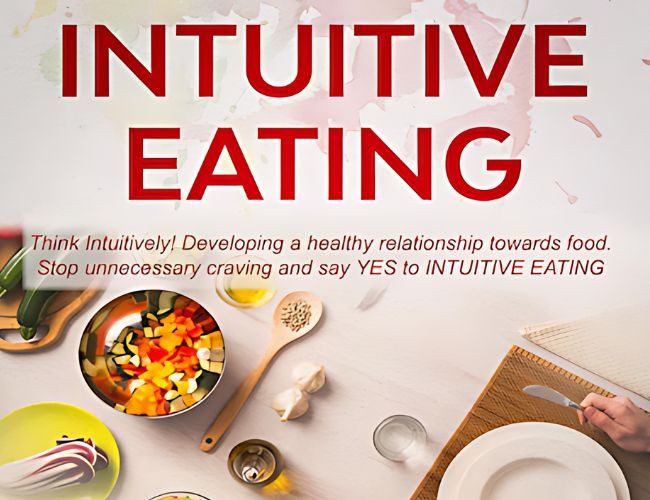Intuitive Nutrition For Strong Client Bonds In Health Counseling
Among diet fads, strict eating plans, and perpetual health trends, all that many people have achieved is a relationship with food that has become strained. As a nutrition professional, it’s really important to understand how to help nurture that positive client relationship with food. This blog will explore just how intuitive eating may empower clients to reconnect with their body’s needs to enhance overall health and wellness.
Knowing Intuitive Eating: An Introduction to a Healthier Relationship with Food
Quite often, the intuitive approach provides a refreshing break from the traditional diet and nutrition approach for many clients. Intuitive eating is, thus a holistic structure that instructs individuals to listen to their body’s cues for hunger and fullness rather than following hard and fast diet rules. It can fundamentally change their attitude toward food so that food transforms from stress source to nourishment source.
What Is Intuitive Eating?

The intuitive way of eating encourages a healthy relationship with food by respecting hunger, fullness, and satisfaction. Dietitians Evelyn Tribole and Elyse Resch designed it; ten principles help foster a healthy relationship between the client and food. In contrast to weight loss targets, intuitive eating encourages accepting a positive relationship with food, and rejecting diet mentality.
Why is It Important to a Positive Client Relationship with Food
Liberate and empower clients by practicing intuitive eating so they break away from the mindset of restrictive eating and take full control over their food choices. Intuitive eating can also correct binge and emotional eating patterns that are formed mainly due to years of dieting and food restriction.
Key Physical and Mental Health Benefits of Intuitive Eating in Nutritional Counseling

Key physical and mental health benefits associated with intuitive eating include:
Less Disordered Eating Behaviors: An intuitive-eating approach encourages the clients to listen to their body and therefore discourages them from engaging in specific disordered eating behaviors.
Improvement of Mental Hygiene: Many people got relief from constant food guilt that enhanced self-esteem as well as body image.
More Client Satisfaction: Through intuitive eating, clients have a more satisfying relationship with food because they choose what they really love.
Since a dietitian can help the clients make better client relationships with food through intuitive eating, general well-being increases for the client because the clients can make choices that reflect their needs and lifestyles for their food.
Empowerment in Nutrition Education Leads to Strong Client Relationship

One of the things that are crucial in establishing a good relationship with food is teaching people to trust their instincts when eating. Here are some very practical ways you can help nudge your clients in the right way.
1. Education on the significance of intuitive eating
Start with science through intuitive eating. Explain to the clients that it is not about ignoring health but finding balance between physical and emotional needs. Sharing research findings on the benefits of intuitive eating can help explain to the clients that they are working toward a healthier mindset and relationship with food.
2. Build Body Trust and Self-Compassion
They tend to experience what’s called a problem of body image, which may affect their relationship with food very significantly. Help them be self-compassionate by letting them know that it is not necessary to achieve certain unreal standards in order to be healthy or satisfied. This eventually provides an enabling environment and promotes a positive rapport between the client and food.
3. The Introduction of the Hunger-Fullness Scale
The hunger-fullness scale is very helpful in terms of guiding clients to recognize and respond to their hunger and fullness cues. The scale is a number from 1 to 10 (starving to uncomfortably full) that can guide clients to eat when they are moderately hungry and stop when they feel comfortably satisfied.
4. Give Unconditional Permission to Eat
One of the main principles of intuitive eating is self-permission to eat all foods. Many of their clients have reported giving up or controlling particular foods leads to guilt and, ultimately, bingeing on them. Removing the labels and emphasizing food neutrality will help break the cycle of food guilt and improve their relationship with food.
Common Myths about Intuitive Eating and How to Address Them

Many clients will fear intuitive eating particularly if they’re used to certain dietary guidelines. Here are a few common myths and how to answer:
Myths #1: “Intuitive Eating Means Eating Whatever I Want, Whenever I Want”
While intuitive eating does honor cravings, it is not about eating with no apparent boundaries. Instead, it’s being extremely intentional in choice and paying attention to when the body needs to eat. There is a need to help clients realize that intuitive eating is all about being balanced rather than binging.
Myth #2: “Intuitive Eating Doesn’t Look at Health”
Most clients fear that intuitive eating is a lax practice that pays no heed to nutritional value. What they do not understand, however, is that intuitive eating promotes both physical and nutritional fulfillment simultaneously. Educate clients on gentle nutrition in intuitive eating; nutrient-dense foods are accessible without restriction.
Myth #3: “Intuitive Eating Won’t Help Me with Weight Loss”
Intuitive eating is not about weight loss, although many clients may lose weight as they listen to their hunger and fullness because they do not have to focus on restricting in order to lose weight. Caution that intuitive eating is about health and remind clients that the ability to improve the relationship with food builds long-term health.
Key Techniques to Build the Client Relationship

A trust, communication, and support relationship is highly effective in a client. Remember to implement these strategies while supporting your clients toward intuitive eating.
1. Practice Active Listening
Listen to challenges and experiences without judgment as it creates a safe space and allows people to feel heard and valued. The client needs this trust in order to develop a sound client relationship with food and be open about their frustrations.
2. Provide realistic and practical advice
Not all clients will easily digest intuitive eating. For others, they might not be ready to break loose from the long-held food rules. Provide realistic and personalized guidance that allows the gradual adjustment for such clients to the concept of intuitive eating.
3. Overcome Emotional Eating
Most of the clients on a diet are usually guilty and ashamed about their emotional eating. Teach the clients what triggers them to emotional eating and how they can use other alternative actions to deal with stress appropriately. This way, you are supporting your clients to start again rebuilding their relationship with food and healthy coping mechanisms.
Conclusion: Building a Sustainable Relationship between the Client and Food through Intuitive Eating
At Fitrofy, we believe in empowering clients to build a positive, lifelong relationship with food by embracing intuitive eating. In a world dominated by diet culture, guiding clients to tune into their bodies, honor hunger, and practice self-compassion helps them break free from restrictive diets and develop a balanced, fulfilling approach to health. This method doesn’t focus on temporary fixes but nurtures sustainable, health-centered changes. With intuitive eating, clients are equipped to move beyond the confines of diet culture, stepping into a lasting, vibrant lifestyle.
Prioritize health and well-being with an easy-to-use solution! The Smart Diet Planner supports daily wellness and energy. Discover the benefits of better health habits today.
Download now or reach out at dietitian@smartdietplanner.com |
+91-7037679715 | https://business.fitrofy.com/
